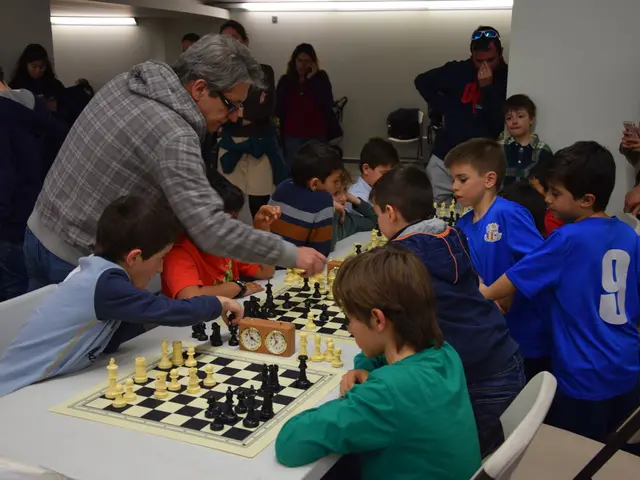The Enchantment of Fortune: Unveiling the Allure of Casino Games that Captivates Us
The Allure of Casino Games: A Study of Brain Chemistry and Psychological Factors
Casino games have long been a source of fascination for many, with their bright lights, captivating sounds, and the promise of big wins. But what is it about these games that keep people coming back for more? A closer look reveals an intricate interplay between brain chemistry, psychology, and design.
Brain Chemistry: The Role of Dopamine
At the heart of the casino experience is the release of dopamine, a neurotransmitter associated with pleasure and reward. This release creates an intense excitement and pleasurable rush, whether it's from winning or simply playing the game. This reinforcement encourages continued gambling, as the brain becomes conditioned to seek out this pleasurable feeling [2].
However, over time, the brain adapts, reducing dopamine sensitivity. This means gamblers require more frequent or higher-risk bets to achieve the same pleasure, contributing to a cycle that can lead to addiction [1][2]. In fact, research shows that gambling addiction activates brain pathways similar to those involved in substance abuse [3][4].
Psychological Factors: Motivation and Cognitive Biases
Motivational factors such as boredom, stress relief, and leisure drive many people's participation in gambling. During the COVID-19 pandemic, for example, people sought distraction and relaxation [4].
Cognitive distortions, including the "illusion of control" and the gambler's fallacy, are common and contribute to persistent gambling despite losses [4]. Personality traits like impulsivity increase susceptibility to gambling problems [1]. Environmental factors and demographics, such as financial struggle, loneliness, younger adults, and men aged 18-29, are linked to higher risk of developing gambling addiction [1][5].
Comorbidity with mental health disorders, such as bipolar disorder, schizophrenia, substance use disorders, PTSD, and personality disorders, is frequent and exacerbates vulnerability to compulsive gambling [1][2][5].
The Design of Casino Games
The design of casino games is carefully crafted to tap into these natural reward systems and psychological motivations. For instance, the concept of "disguised losses" is used in online casinos, where a one euro bet results in a payout of 50 cents, which is factually a loss, but is presented as a win on the screen with lights and sounds [6].
The "near-miss" effect, where the gambler almost wins but doesn't, is interpreted by the brain as motivating partial success [6]. Modern online slots are designed as interactive experience machines, with every small win turned into a grand event with light cascades, fanfares, and the sound of cascading coins [6].
The high game speed in online casinos ensures almost non-existent waiting times and can put players into a "flow" state - a mental state where the sense of time and rational distance from the game are lost [6]. Casino games offer a simple and clear goal, immediate feedback, and mental relief from daily chaos. Rituals like choosing lucky numbers or specific slot machines give a feeling of being active participants, even though they have no impact on the outcome [6].
Conclusion
In summary, the popularity of casino games emerges from an interplay of dopamine-related brain reward pathways that create strong feelings of excitement and pleasure, combined with psychological motivations and cognitive biases that encourage repeated play despite negative consequences [1][2][3][4]. Gambling activates the "wanting" system in the brain, which is fueled by a mechanism of variable reward. Casino games feed the human longing for the illusion of control. The true master of the game is not the one who wins, but the one who knows when to stop.
It is crucial for players to be aware of these factors and to gamble responsibly. Modern online casinos should have a valid license from the GGL (Joint Gaming Authority of the States) to guarantee adherence to the German Gaming State Treaty and strict requirements regarding player protection, data protection, and youth protection.
- The role of economic and social policy comes into play in regulating casino gambling, as it aims to balance the entertainment industry's economic contributions with preventing gambling-related problems, such as addiction and financial struggles.
- A growing interest in the casino-culture and personalities can be observed, with many influencers and celebrities showcasing their experiences with casino-games on social media, further fueling the gambling trends among the younger demographic.
- As the line between casino gaming and other forms of entertainment becomes increasingly blurred, the impact of casino-culture on society, mental health, and personal behavior is gaining more attention in economic and social policy discussions.






